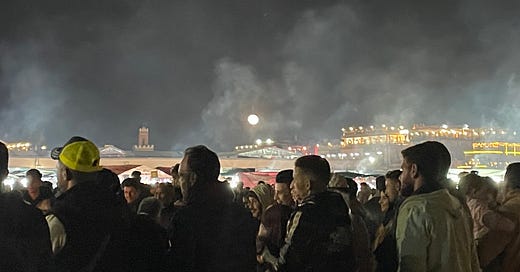What a new survey says about Arab unity
Abu Aardvark's on a road trip, but check out the fascinating new Arab Opinion Index!
Apologies for not blogging since the holidays. I’m in Morocco as part of a three city, four stop road trip taking advantage of GW’s late start to the spring semester. In Rabat, I’ll be co-leading a Pasiri workshop for early career African scholars on climate change, water, and environmental politics on the African continent. It’s our second in-person workshop and third overall, and I’m excited to share the papers with you all in a couple of months. Then I’m heading to Qatar for a couple of days to co-lead a fun workshop at Georgetown Qatar on sports and politics in the MENA region beyond the World Cup — though, I’m quite sure we’ll be talking about the remarkable events of the Doha World Cup (especially Morocco’s magical run to the semifinals) quite a bit. Those papers will be out in a couple of months too. Morocco, Qatar and Paris is the perfect World Cup travel itinerary - I just need someone to invite me to Argentina now. Barring that, it’s back to DC for the start of the spring semester!
I’ll be resuming my regular schedule of book reviews, scholar spotlights, and other MENA Academy spotlight soon. But in the meantime, I wanted to share some fascinating findings from the newly released Arab Opinion Index, an annual undertaking of The Arab Center for Research and Policy Studies based at Qatar’s Doha Institute. They have been running a large-scale survey of Arab public opinion for the last decade. This year’s survey, just released Tuesday, includes what may be their biggest sample yet — 33,300 respondents from fourteen Arab countries. Their report (I can’t find a link online yet, sorry, but here are some highlights) presents a wide range of findings, both aggregate, country-by-country, and subregionally grouped (North Africa/Maghreb, Nile Valley (Egypt and Sudan), Levant/Mashreq, and the Gulf (represented by Qatar, Kuwait and Saudi Arabia).
The report is full of important findings about Arab attitudes towards politics, democracy, the economy, religion, and much more. But I wanted to just highlight one big theme here: the huge subregional variations in experiences and attitudes but continuing belief in Arab unity.
Just look at the spread in responses to the right direction/wrong direction: 89% of respondents in the Gulf thought things were heading in the right direction, while 84% of the Levant saw things heading in the wrong direction. That tracks with what we’d expect. The Gulf is riding another wave of high energy prices, projecting strong nationalist projects, and is generally just extremely wealthy with high degrees of state capacity relative to the rest of the region (and the world)… at least for the citizens. Meanwhile, Syria, Lebanon and Palestine are living through acute crisis across every possible dimension, with Jordan just barely hanging on. That’s one of the starkest demonstrations in a single figure that I can remember of the reality of subregional differences within the broader Arab world.
At the same time, 80% of respondents overall said that they believed that the Arab peoples constituted a single nation, dividing roughly equally over the importance of local and national particularities, with relatively insignificant subregional variations. 75% overall say that the Palestinian issue concerns all Arabs, with the highest level of agreement in the Maghreb. There’s little significant variation in attitudes towards US policy in Palestine — only 11% have a positive view. Only 8% support their country recognizing Israel diplomatically: 15% in the Nile Valley but only 8% in the Gulf (though it’s worth noting that 22% there declined to answer, and the UAE/Bahrain weren’t included in the survey).
I’ll be back with more soon!






Thanks, Marc, for the fascinating take on the Arab Opinion Index survey data. Here is the link to the reports of its 8th round in 2022: https://arabindex.dohainstitute.org/EN/Pages/Arab-Opinion-Index-2022.aspx